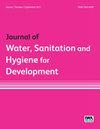学童的卫生和环境卫生做法:对维萨卡帕特南讲卫生条件的评估
IF 1.4
4区 环境科学与生态学
Q3 WATER RESOURCES
Journal of Water Sanitation and Hygiene for Development
Pub Date : 2023-04-28
DOI:10.2166/washdev.2023.229
引用次数: 0
摘要
公共卫生关注的三个独立因素是水、环境卫生和个人卫生。学校的WASH设施的可用性是一个很少被研究的方面,它可能是学业成功的关键因素。本研究旨在评估维萨卡帕特南6-11岁学龄儿童的卫生和环境卫生习惯,如右手用肥皂洗手(RHWWS)、每天两次右手刷牙(RTBTD)和免费露天排便(OD)。大约110所学校被确定,其中包括维沙卡帕特南地区56所城市学校、21所半城市学校和33所农村学校,从中随机抽取了500名学生。只有31所学校(28%)参与了与wash相关的活动。在被研究的学校中,只有58%的学校采用了WASH政策。被选学校的卫生习惯相关结果显着,但总体而言,与2018年联合国联合监测计划定义的标准相比略低。据我们所知,这是第一个使用横断面试验来测试学校WASH设施和实践对维沙卡帕特南小学生的影响的研究。研究结果表明,学童必须保持良好的环境卫生和个人卫生习惯。本文章由计算机程序翻译,如有差异,请以英文原文为准。
Hygiene and sanitation practices in school children: an evaluation of WASH conditions in Visakhapatnam
The three autonomous factors of public health concern are WASH, constituting water, sanitation, and hygiene. The availability of WASH facilities at schools is a little-researched aspect that might be a crucial enabler of academic success. The present study was carried out to evaluate the hygiene and sanitation practices like right-hand washing with soap (RHWWS), right tooth brushing twice a day (RTBTD), and open defecation (OD) free among the school children of Visakhapatnam of 6–11 years of age. About 110 schools were identified, which includes 56 urban, 21 semi-urban, and 33 rural schools in the Visakhapatnam district, from which 500 students were selected randomly. Only 31 (28%) schools were exposed to WASH-related involvements. In the studied schools, only 58% of them have adopted the WASH policy. The results relating to the hygiene practices among the selected schools were found to be significant but, overall, a bit low on criteria defined by the UN joint monitoring program in 2018. To our knowledge, this is the first study to use a cross-sectional trail to test the impact of school WASH facilities and practices among primary school children in Visakhapatnam. The results concluded that the proper sanitation and hygiene practices are required school children.
求助全文
通过发布文献求助,成功后即可免费获取论文全文。
去求助
来源期刊

Journal of Water Sanitation and Hygiene for Development
WATER RESOURCES-
CiteScore
3.10
自引率
11.80%
发文量
58
审稿时长
16 weeks
期刊介绍:
The Journal of Water, Sanitation and Hygiene for Development is a peer-reviewed journal devoted to the dissemination of high-quality information on the science, policy and practice of drinking-water supply, sanitation and hygiene at local, national and international levels.
 求助内容:
求助内容: 应助结果提醒方式:
应助结果提醒方式:


